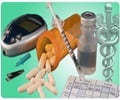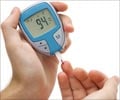The use of electronic health records in clinical settings leads to a decrease in emergency room visits and hospitalizations for patients with diabetes, reveals a study.

"Using the electronic health record in the outpatient setting improved the quality of care in ways that cumulatively resulted in fewer negative events," said Mary Reed, DrPH, staff scientist with the Kaiser Permanente Division of Research in Oakland, Calif., and the study's lead author. "A reduction in the number of emergency department visits represents not just improvements in diabetes care, but the cumulative effect of the EHR across many different care pathways and conditions."
Researchers found that annual emergency room visits declined 5.5 percent, from 519 visits per 1,000 diabetes patients before electronic health records to 490 visits per 1,000 diabetes patients afterward. Annual hospitalizations declined 5.2 percent, from 239 per 1,000 diabetes patients before electronic health records to 252 per 1,000 diabetes patients afterward. The researchers did not find any significant change in the number of office visits for patients with diabetes before and after electronic health records were implemented.
"This study demonstrates that when doctors and patients use an EHR, good things happen," said Marc G. Jaffe, MD, a study co-author and Kaiser Permanente endocrinologist in South San Francisco. "The current study adds to our understanding by describing how an EHR like KP HealthConnect can help doctors keep patients healthy when used as part of an integrated care delivery system."
Kaiser Permanente is widely recognized for its leadership in harnessing health IT to improve quality and care delivery. Kaiser Permanente HealthConnect®, the health care organization's electronic health record, is one of the most robust and sophisticated in the nation.
KP HealthConnect enables all Kaiser Permanente clinicians to electronically access their patients' Kaiser Permanente medical records and serves as a model for other care systems. The EHR is directly connected to My Health Manager on www.kp.org, which empowers members with easy and convenient access to their health information and health management tools like the ability to email their care teams or refill prescriptions.
This study is part of Kaiser Permanente's ongoing work to better understand how EHRs affect clinical care. In October of last year, Kaiser Permanente researchers found that use of the electronic health records was associated with improved drug-treatment intensification, monitoring and risk-factor control among patients with diabetes.
 MEDINDIA
MEDINDIA




 Email
Email










